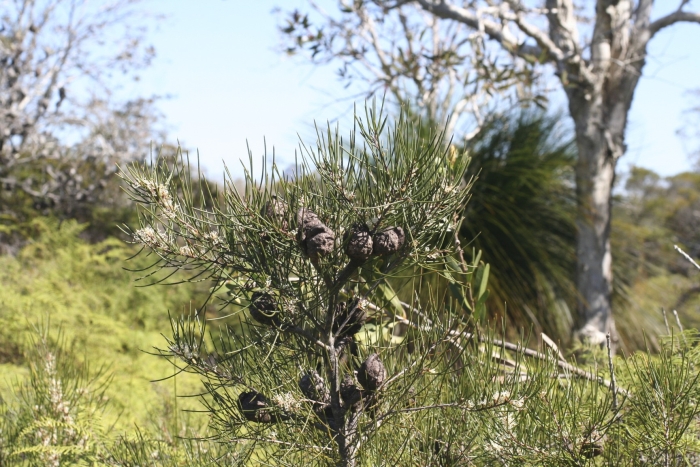Mulloway Needle Bush
(Hakea actites)
Mulloway Needle Bush (Hakea actites)
/
/

Ian McMaster
CC BY 3.0
Image By:
Ian McMaster
Recorded By:
Copyright:
CC BY 3.0
Copyright Notice:
Photo by: Ian McMaster | License Type: CC BY 3.0 | License URL: https://creativecommons.org/licenses/by/3.0 | Uploader: Allthingsnative2576 | Publisher: Wikimedia Commons | Title: Hakea_actites.jpg | Notes: {{Information |Description=Photo taken 28th August wheatbelt photo trip needs id |Source=uploaded by photographer |Date=28th August 2008 |Author=SatuSuro |Permission=Attribution ShareAlike 3.0 |other_versions= }} {{cc-by-sa-3.0}} [[Category:User:SatuSur |
































Estimated Native Range
Summary
Hakea actites, commonly known as Mulloway Needle Bush, is an evergreen shrub or small tree native to coastal heathland and sandy soils in Eastern Australia. It exhibits a prickly habit, growing to a height of 0.3 to 5 meters (1.0 to 16.4 ft) and can form a lignotuber, which allows it to resprout after fire or other damage. The plant produces clusters of white, sweetly scented flowers from late autumn to winter, which are particularly showy and attract pollinators. Its foliage is dense and can be quite sharp, making it an effective barrier plant.
Mulloway Needle Bush is valued for its drought tolerance and ability to thrive in poor, sandy soils, making it an excellent choice for coastal and low-maintenance gardens. It is often used for habitat restoration, as it provides protection and nesting sites for small birds, while its flowers offer a valuable nectar source during the cooler months. This species is suitable for cultivation in full sun to part shade, requiring minimal water once established, and prefers well-drained soils. It is also resistant to many common pests and diseases, making it a robust addition to the landscape. However, its prickly nature should be considered when planting in areas with pedestrian traffic.CC BY-SA 4.0
Mulloway Needle Bush is valued for its drought tolerance and ability to thrive in poor, sandy soils, making it an excellent choice for coastal and low-maintenance gardens. It is often used for habitat restoration, as it provides protection and nesting sites for small birds, while its flowers offer a valuable nectar source during the cooler months. This species is suitable for cultivation in full sun to part shade, requiring minimal water once established, and prefers well-drained soils. It is also resistant to many common pests and diseases, making it a robust addition to the landscape. However, its prickly nature should be considered when planting in areas with pedestrian traffic.CC BY-SA 4.0
Plant Description
- Plant Type: Shrub
- Height: 10-15 feet
- Width: 10-20 feet
- Growth Rate: Moderate
- Flower Color: White
- Flowering Season: Fall, Winter
- Leaf Retention: Evergreen
Growth Requirements
- Sun: Full Sun, Part Shade
- Water: Low
- Drainage: Fast
Common Uses
Drought Tolerant, Low Maintenance
Natural Habitat
Coastal heathland and sandy soils
Other Names
Common Names: Wallum Hakea
Scientific Names: , Hakea actites,
GBIF Accepted Name: Hakea actites W.R.Barker